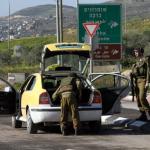A Palestinian Boy with a Gun to His Head Asked If I Was OK. I Still Think About Him

As an actor and storyteller, I always felt that I was an extremely sympathetic person. That was a source of pride. But a couple of years ago I realised my sympathy was, in fact, pointless. It was devoid of any value whatsoever. My sympathy allowed me to merely sit as a spectator in the arena of human struggles. It achieved little for others. What I needed was to re-engage with something I had forgotten how to do: empathise.
In 2014 I found myself travelling along the West Bank on a coach with about 30 young Palestinians. This journey was full of music and dance. Darbukas and dabkes. And I was involved. It was impossible not to be. That is what empathy is. Feeling with others and not for them. But along this journey, that empathy turned quite suddenly to sympathy. Our bus had to pass a roadblock guarded by Israel Defence Forces soldiers. Guns were pointed at our driver and he was forced to halt the bus, throwing the younger members of the group 10 feet down the aisle. As we all scrambled to our seats, I immediately sat next to a young Palestinian boy of 13.
One of the IDF soldiers entered the bus and shouted at us for paperwork, permits and identification. As we sat silently, staring down the barrel of his gun, the 13-year-old boy sitting next to me turned and asked if I was all right. I simply nodded. He smiled at me and said: “Don’t worry, it will all be fine.” I suddenly felt rather embarrassed. Embarrassed that a 30-year-old man was being comforted by a child.
The soldier began walking along the bus and at that moment I needed to feel good about myself. So what did I do? I acknowledged my sympathy. I felt for this kid sat next to me. I reminded myself no child should have to stare down the barrel of a gun. I reminded myself no child should have to feel the fear of death. I reminded myself this was all so wrong. And I ultimately reminded myself that my sympathy did nothing for my 13-year-old companion.
This lad looked to me again and observed that I was nervous. “Smile, it will help!” he said before asking for my passport. I didn’t even question giving my British passport to a 13-year-old child. He placed the passport visibly on my lap and said something that made me realise my sympathy was futile. “This is Kryptonite, remember that.” The soldier arrived at my seat and pointed his gun in my young friend’s face, while the boy showed a stoicism that I did not know existed in children. The soldier then clocked my passport, and lo and behold, he moved on. Kryptonite.
I am often reminded of that young boy whenever I see news of the destructive events happening in the region. All I can think is: I hope he is still smiling. I thank him for helping me to re-engage my own sense of empathy but also for understanding what it means. Empathy is the ability to not be able to switch off the news or put down a newspaper when the suffering of others is so prominent. Empathy is not sitting in the political chambers around the world, talking, but rather doing. Empathy is not turning a blind eye to the destruction of innocence we are seeing in our youth; whether that be a child living in the confines of Gaza, surrounded by nightly airstrikes, or an Israeli child living within the range of Hamas rockets. Empathy forces world leaders to not just condemn with shallow sympathy, but to take action and save our children.
That 13-year-old boy made a choice to feel with me, rather than for me. And that was humiliating for me to acknowledge: that I didn’t have that capacity as an adult. But maybe we need to feel humiliated sometimes. Because if a child already possesses that quality, then we as adults need to re-educate ourselves. Children exhibit empathy by putting themselves inside the struggles of others and help to find a way out together. Children realise that empathy spurs us into positive action, sympathy doesn’t.
• Tariq Jordan is an actor and writer with dual Arab-Muslim and European-Jewish heritage. His play Ali and Dahlia is at the Pleasance Theatre in London, until 14 April
